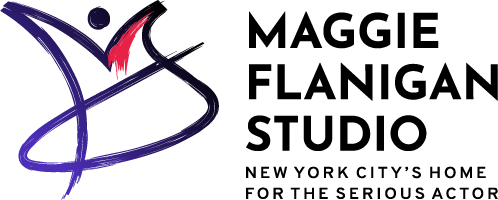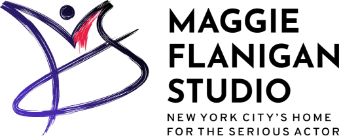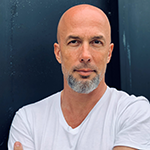APPLY FOR ADMISSION
FIRST YEAR MEISNER ACTING PROGRAM

BEGINS
SEPTEMBER 10TH

Call To Schedule an Interview
(917) 794-3878
Running Towards Myself
The Maggie Flanigan Studio provides a two-year professional actor training program. In this interview, Belen Cusi discusses the decision to train with the studio after working as a commercial actor model.
Two Year Acting Program – Belen Cusi Interview

c
Q: Belén, before we get into questions about the pandemic and acting classes on Zoom, just a little bit of background about yourself. What did you think it meant to train as an actor before you started studying at Maggie Flanigan Studio?
Before I started studying at Maggie Flanigan, I was mostly a commercial actress and model. Mainly all the acting work I was doing was in commercials, and I did that for several years. Any training I had done had been more commercial-based and about looking good in front of the camera, speaking, creating an appearance, or coming off as good as possible. I think I had a notion of, and ultimately is what I found, and what drew me to Maggie was the idea of training more for film, for character work, for more profound behavioral work. My concept evolved once I started thinking about expanding into film acting.
Q: How has your idea of training changed after finishing the first year of the two-year program?
It has grown, it has expanded, and it has become so much more personal than I thought it would be. I remember Charlie’s interview; I said I want to act because I want to live other experiences. I want to be outside of myself and inhabit these different characters and other lives. Charlie said, “Yes, but it’s still you.” I was running away from myself, and what the training has taught me is that I have to run towards myself to be the actor that I want to be. It has opened me up to transformation on not just an artistic level but a personal level.
Q: Had you ever worked with the Meisner technique before you started training at the studio?
I had not.
Q: If you could pick one or two things that resonated with you about the Meisner technique, what would those things be?
I would say the first and fundamental thing would be working from our imagination and not having to pull from past personal and traumatic experiences, and strengthening our muscles of creativity and how that can also enrich our lives beyond acting. That leads me to the second thing, which I think is embracing your inner child and bringing a childlike wonder and innocence and also fearlessness to work into our lives.
Q: What would you say is the biggest thing that you learned about yourself that surprised you during this first year of training?
Oh, good question. I was surprised by how deep I was able to go. This work has genuinely saved my emotional life in a way that it’s reconnected me with the essence of who I am emotionally, and it’s allowed me to reclaim or begin to reclaim my vulnerability and to embrace that. I was surprised and humbled by realizing that the work works. I trusted Charlie and Maggie from day one, and I truly began to transform, and I’m so excited to continue on that journey.
Q: Can you talk a little bit about the auxiliary classes?
Sure. It felt very holistic and like I was on triple throttle having the movement, especially the voice classes and the movement classes. I’ll even mention the theater history class because it gave context to a lot of the work we were doing, and coming from a non-theater background, it enriched the experience. Voice and movement were going hand in hand with the work we were doing. Charlie would tell us we have to loosen up and open up our instrument and ease the tension. I was so glad to be doing that in the movement class, and not having that with the virtual experience has only highlighted the importance of having that holistic approach. I can’t wait to be able to do more of that work again.
Q: How did the sense of community affect your experience this year in the studio and classes on Zoom?
I’d say both experiences in person and online have shown the importance of having an artistic community. I’ve always been very much of a lone wolf, and I came into Maggie, like I said, pretty emotionally unavailable and very focused on my career path and the only things that I was doing. It took me a couple of months to warm up to the people in my class to open myself up. That’s why I came to Maggie. I wanted to be surrounded by other artists, by other people on the path. I found it invaluable to have that energy and not only speaking virtually once we went online, but it also gave me that connection, that life support to my artistic life that I wouldn’t have had otherwise. It became super, super important, not only watching my peers work and getting their feedback, but my work being observed by my peers and just growing together. It gives you comfort that you’re not alone on this path and that the struggles and the doubts that you’re experiencing are similar to your person.
Q: What was your experience finishing up the first year online with the virtual platform?
Yes. The example I always give is a silly one, but if you’ve ever had to break up with someone and you were like when we were younger, when do I do it via text or call or in person or at least call them. Then we had Skype, and it was like FaceTime, and it was just as freaking scary as seeing them in person. I make the same comparison because we have video, and because I see your face and the contact is, I would say 95% real contact. We don’t have the physical spontaneity, and so I’ve just found the work to translate beautifully to the camera. We’re human beings, we adapt, we’ve gotten used to it, and so much of the industry’s work will involve these screens that I completely embraced it. I found that having to do the work by myself was harder, yes, and it challenged me to go deeper.
It’s making me better because I have to focus more. I have to manage myself better, and I have to go deeper with the work, and I’m thrilled. I’m delighted that I took that on, and I’m looking forward to doing the second year online. Right now, there isn’t another option, and that’s why I encourage anyone who’s on the fence about it you get plugged into this great community. You’re getting the training, and it’s more or less very equal to what would have been in person, and you can do it from wherever you are. I think it’s a blessing. I think it’s a blessing, and I speak very highly of it. It’s a good experience.
Q: Did you feel like Charlie’s expectations and standards changed because the classes were online?
I think Charlie handled an unprecedented and wildly confusing situation with so much poise and vulnerability and honesty with us and gave us space and empathy when we were transitioning. Once we reestablished, this is the way things will be online, and Charlie was Charlie, and he is holding us accountable for our work, and I wanted that. He’s never faltered in his standards with us and continues to push us even harder now because of the extra effort required to work on this platform.
Q: What has the transition been like from the physical classroom to the online classes? Can you imagine doing this work in a school with everyone wearing a mask?
I think it would create a subconscious; it would make an extra layer of consciousness, precisely what we’re trying to debunk or collapse. I believe we have the screen limitation, but beyond that, we’re actually wholly liberated because we’re in a safe, contained space wherever we are, and then we’re working off the screen. That is what frees us. I agree with you. I think working with a mask, however attractive the prospect of some physical work might be, I would love that, but I know I would feel physically hindered. I laughed when you asked because I remember this is pre-COVID when someone would come in not feeling well or with the flu or was a little runny, and I was just like, “I’m going to get sick today.” Because there was contact, of course, we were in each other’s faces; we were entirely not holding back and spontaneous.
I think it would be detrimental to the work because then I think we would develop a habit of squelching that, so that we- oh, no, we don’t want to get too close. I feel much freer to do the work here on the camera without fear of any physical contact.

Professional Two Year Acting Programs – Maggie Flanigan Studio – Belen Cusi Interview
Q: You have already been doing a lot in the entertainment industry, being an artist and a creative. Why was this program important for you? What would you say to someone who thinks that they don’t have time to train in a program like this?
Absolutely. That’s a great question and a valid concern. I had wanted to train for a few years, and those same excuses would always deter me from pursuing a program. It’s too late; I’m too old, I’ve already lost way too much time, I need to work, I need to make money, I don’t want to pause the momentum that I’ve created. However, when push came to shove, and I got serious about film acting, I said, “Okay, the time’s going to pass no matter what.” I can grind day in and day out trying to build a reel; I didn’t have a film reel. These two years can pass, and what am I going to have after those two years? Am I going to have all these free jobs that I did that I didn’t enjoy, and that might not be great? Or do I want training under my belt that I think with my hard work and my perseverance is a better guarantee of truly entering this industry as a competitive player?
I had this thought two years ago, and had I started two years ago; I’d already be done. Why don’t I start now so that I don’t make the same observation in two years? Those are valid concerns, but I think what you’re going to get out of a training program is going to reap better long-term benefits than continuing to grind it out. If what you value is having a craft, honing a skill, and what your lived artistic experience is at the end of the day. For me, I thought, “Well, I want to master my craft. I want to work on myself as an artist.” This is not going to be time wasted or getting farther behind. If anything, this is a life experience that I’m proving it is changing my life, and it’s also moving my career forward. I’m confident that I’ll be in a stronger position coming out of it. I would encourage anyone passionate about the art of acting to pursue the training at virtually any age.
Q: How would you describe Charlie as a teacher?
I would describe, to start with that smile, Charlie is a demanding acting teacher. He is not a forgiving teacher, but he is keenly aware of– He sees his students. I feel seen by Charlie, and I see him seeing my peers. I see how he knows just the right things to say or not to say or do or not to do that will get us up the next wrong or where we are. I think he demands excellence from us. He pushes us. I know he has helped me reframe, and I’m still redesigning what my work ethic looks like as an artist. That’s one of the most significant gifts that I think he offers as a teacher because that’s what you need to learn as a teacher. I teach piano students, and what you want to teach is a way to work, not just how to produce results. I think Charlie indeed does that.
Q: What are you looking most forward to about the second year?
I am very excited to be back in the classroom with Charlie and my classmates and very enthusiastic about getting into the work’s meat. Well, not the meat because the first year is very much the meat, but the second portion of the heart, the main character work, and to truly create these characters and get into different latter aspects of just becoming another human being for the screen.
Q: Do you have any final bits of advice or encouragement for anyone on the fence right now about committing to training?
I have words of encouragement only. I think there’s never been a lower risk as far as there’s very little to lose. I think if you can afford it in your home, and again, it’s like your lifeline to an artistic community. I left New York City, where I was based, and I was afraid to be away from the hub and to feel like I was not in an artistic environment. Certainly acting, being able to do the training online helps keep me connected to that pulse. I will encourage people if they doubt to go for it because they’re going to question otherwise. Just have a doubt. Get it out of your system. I don’t think about being disappointed at all, and I think it’ll be a positive experience no matter what.
Learn More About the Two-Year Acting Program
To learn more about the two-year acting program and the studio’s online acting classes, visit the studio website https://www.maggieflaniganstudio.com and contact the studio with any question by calling (917) 794-3878.
Recent Post
STUDENT TESTIMONIALS
“I was placed in the intense reigns of Charlie Sandlan. I became a better artist, actor, friend, sibling and daughter because of the studio. Even now, I crave the studio every day. What I learned is present in my work every day. I truly believe in everything they stand for.”

“Maggie taught me that I could control my work, my acting, and to throw all of the bullshit out that I had in my head about ‘what I should be doing’ and to just listen and respond honestly, in the moment. She gave me a craft. She is, quite simply put, THE BEST.”
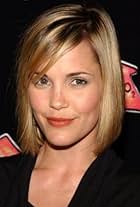
“Maggie Flanigan taught me the true meaning of artistry, passion, and professionalism. I am certain that I continue to work as an actress because of my training with Maggie. At every audition and every performance, her guiding voice is with me. It is a gift beyond measure.”

“Maggie Flanigan is uncompromising, her instincts as a teacher are razor sharp. She doesn’t miss a beat”

“Maggie Flanigan has been one of the most important people in my artistic life. I want to work with Maggie trained actors. As an actor myself, she is my first source. I do not say this lightly, if you are serious about acting, and willing to work very hard, then go to Maggie.”

“Maggie helped me find my sense of truth, an actors greatest asset. Maggie is an expert at instilling that vital ingredient, which allows an actor’s potential to become limitless. My work will forever be rooted in the clarity and honesty she helped me develop.”

“After working for ten years, I did the 2 year program, and now feel that I have the tools I need to become the actor I’ve always dreamed of being. Maggie Flanigan instilled in me a clear sense of truth and a standard of perfection. I am a better actor because of this studio.”

“As an actor, the core of what you have to rely on is your sense of truth and humanity. Maggie allowed me to discover and embrace mine. Trusting my sense of humanity and truth has given me the ability to take risks in my work and my career decisions.”

“Maggie Flanigan has the unique ability to get an actor to the essence of what is true in a moment. She creates a safe and caring environment in which to work.”

“Maggie Flanigan introduced me to my own spirit and my own sense of Truth. Her passion for teaching and ability to communicate are rare gifts to any actor looking for a technique to set his or her talent free. Maggie’s voice has been the one constant guide in my career.”

